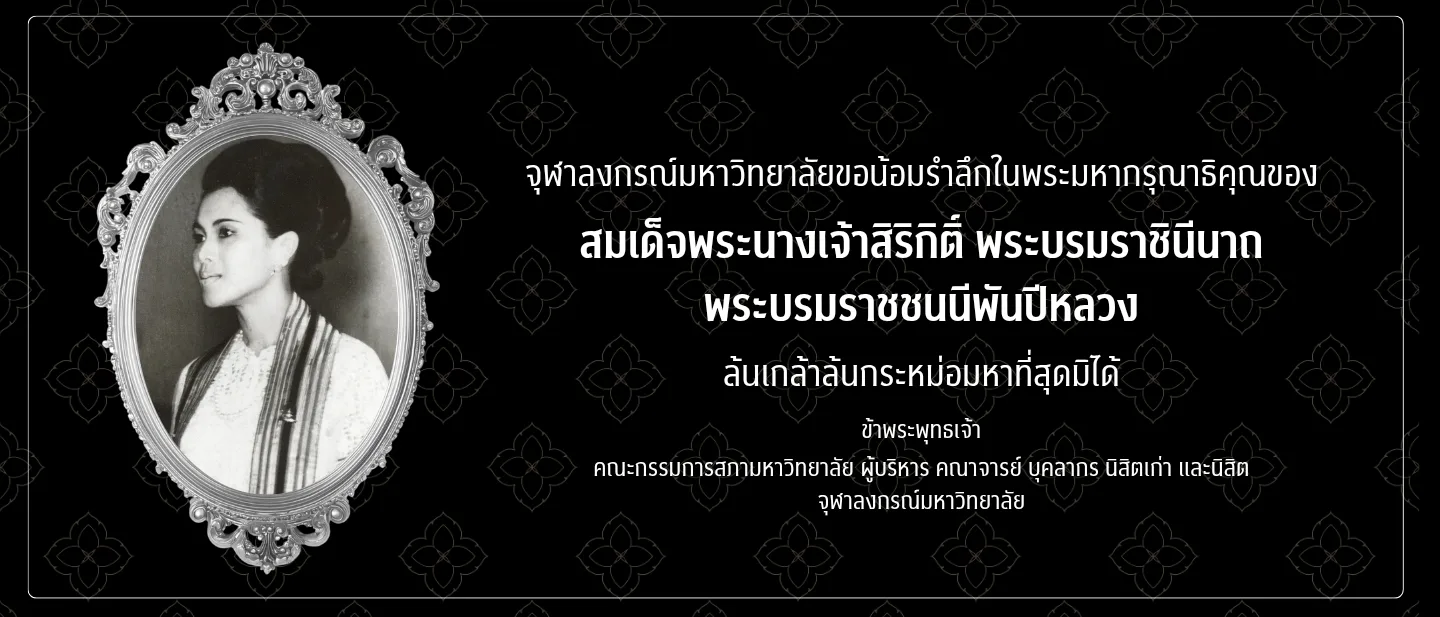CU TRAINING AND DEVELOPMENT ROADMAP has three main dimensions for personnel development as follows:
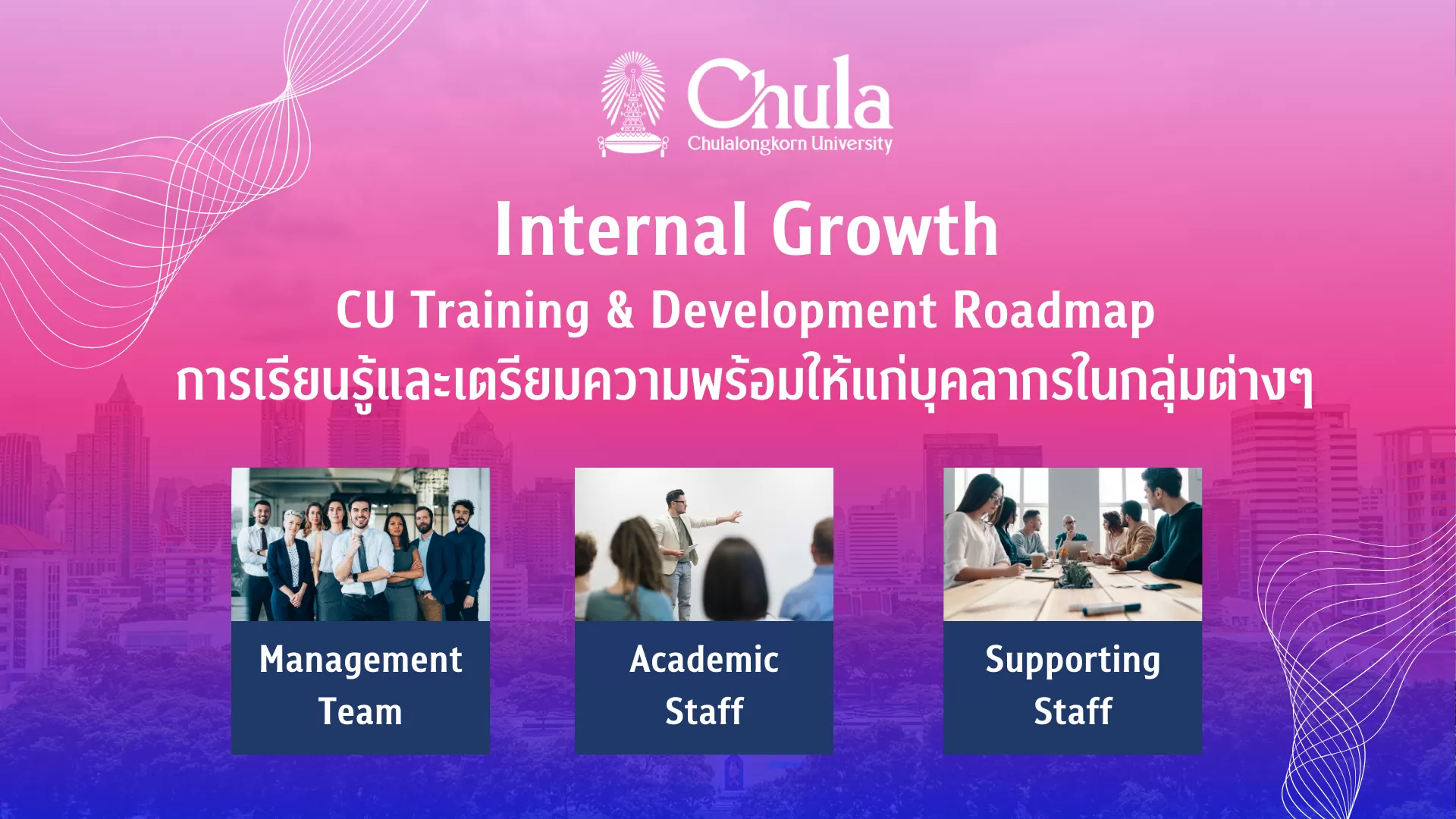
The plan divides the Chulalongkorn University Training & Development Roadmap into four categories of personnel as follows
1.Academic Leadership Group
1.1 Senior Academic Leadership Group consisting of the President, Vice Presidents, Assistant Vice Presidents, Deans, and Directors of Institutes.
1.2 Mid-Level Academic Leadership Group consisting of Associate Deans, Deputy Directors of Institutes, and Department Heads.
2.Operational Leadership Group consisting of Directors of Offices/Departments/Centers and Supervisors.
3.Faculty and Researcher Group
4.Operational Staff Group
In terms of dimensions for human resources development, the content is divided into three main areas as follows:
Dimension 1: Onboarding Programs
This dimension focuses on the development and care of new personnel, helping them learn and understand the organizational culture, relevant information about the organization, adapting to the environment, and building relationships with university staff. It also includes the development of newly appointed executives.
Dimension 2: Professional
This dimension focuses on developing personnel in terms of knowledge, abilities, skills, and expertise in their core professional fields. The goal is to advance their careers both in the short and long term. The development is clearly defined and systematic, categorized into academic and operational groups.
Dimension 3: Leadership / Soft Skills
This dimension focuses on planning and developing personnel to have self-leadership skills in management, which are beneficial for both individual performance and collaboration with others. It also encompasses various aspects aligned with the changing global landscape.
In addition to the development in the three main areas, the personnel development roadmap also includes fundamental development that personnel should receive to integrate into the university’s culture, values, and direction. It also supports learning based on the 70-20-10 theory.
The Division of Learning and Human Resource Management has designed a detailed personnel development plan for Chulalongkorn University for the fiscal years 2024–2027 to ensure clarity in implementation and provide an overview of personnel development across all dimensions. The course topics outlined serve as an initial framework to guide the practical implementation, with the flexibility to review and adjust according to the university’s strategies and organizational changes.
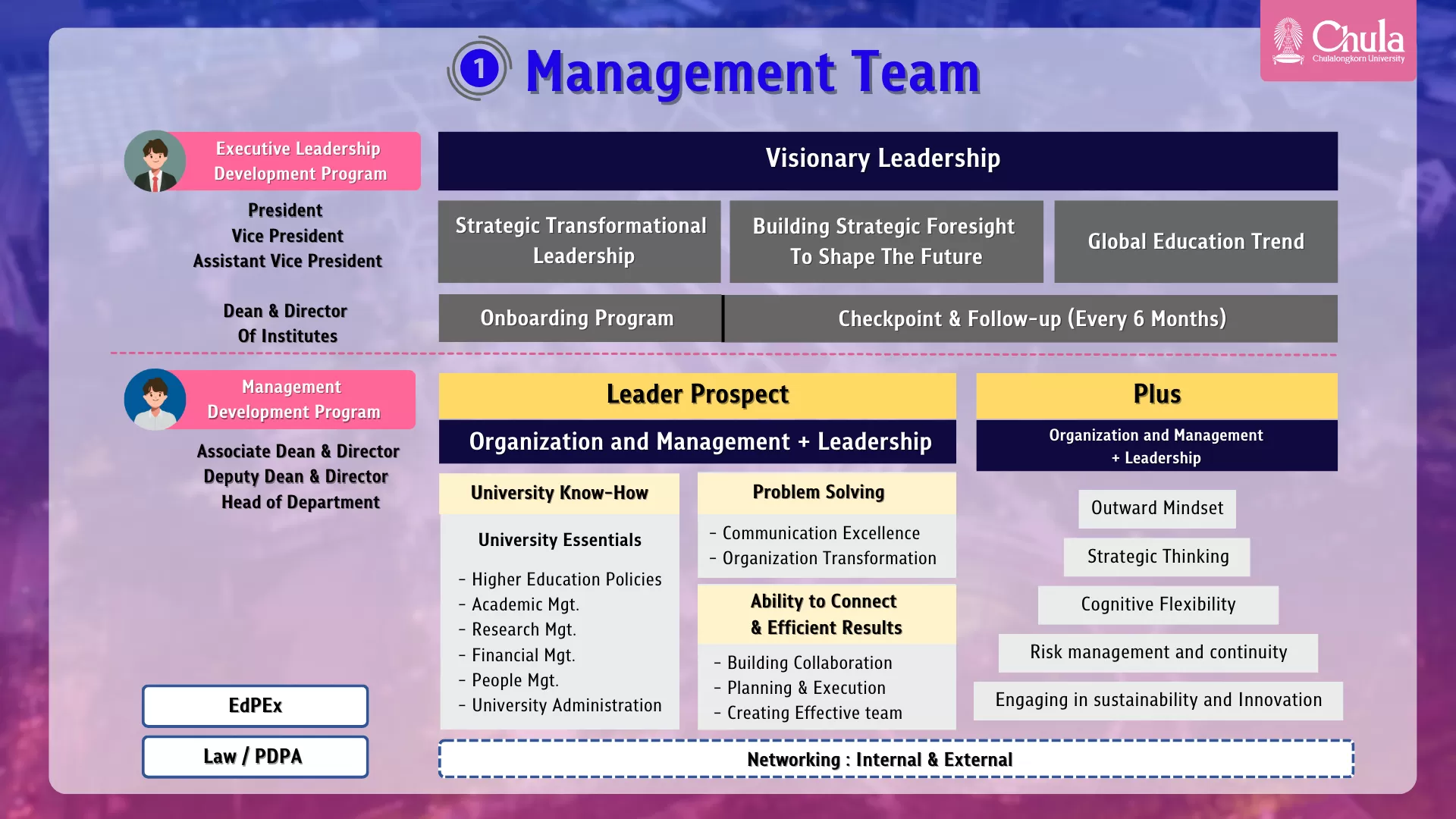
The personnel development plan for the Academic Leadership Group is divided into two main categories
1.1. Academic Leaders(Executive Leadership) at the levels of President, Vice Presidents, Assistant Vice Presidents, Deans, and Directors of Institutes.
1.2. Academic Leaders (The Leader Prospect) at the levels of Associate Deans, Deputy Directors of Institutes, and Department Heads.
For the Executive Leadership group, development begins once individuals are appointed to positions such as Deans or Directors of Institutes. Onboarding programs will be organized from the very beginning of their tenure to help them understand the organization’s strategy and operational direction. Additionally, the Executive Leadership group will receive development in key areas related to strategic organizational leadership through various courses such as Strategic Transformational Leadership, Building Strategic Foresight to Shape the Future, and Fostering Innovation and Creativity in Teams.
For the Leader Prospect group, it is essential to understand various contexts of the university and its direction for driving the institution forward. The Organization and Management will offer the University Essentials course (covering academics, research, innovation, finance, human resources management, and general administration) to ensure that leaders understand the university’s direction and goals in alignment. This will lead to effective planning and execution to achieve successful outcomes.
Additionally, leaders in this group will be developed in the area of leadership to support organizational advancement and prepare for future promotion to senior executive roles. The development includes various courses such as Planning & Execution, Building Collaboration, Communication Excellence, Outward Mindset, Strategic Thinking, Cognitive Flexibility, and more.
Additionally, the development of the Academic Leadership Group should include the creation of preliminary knowledge courses to foster understanding and ensure alignment with the university’s goals. These courses should cover areas such as education quality criteria for excellence in operations (EdPEx) and legal knowledge for university executives, including the Personal Data Protection Act (PDPA), administrative law in university governance, laws related to preventing and combating corruption in the context of public universities, procurement and public asset management laws, as well as other regulations related to university management. Beyond the development framework, academic leaders should also have opportunities to engage in self-development and network with executives at both the national and international levels.
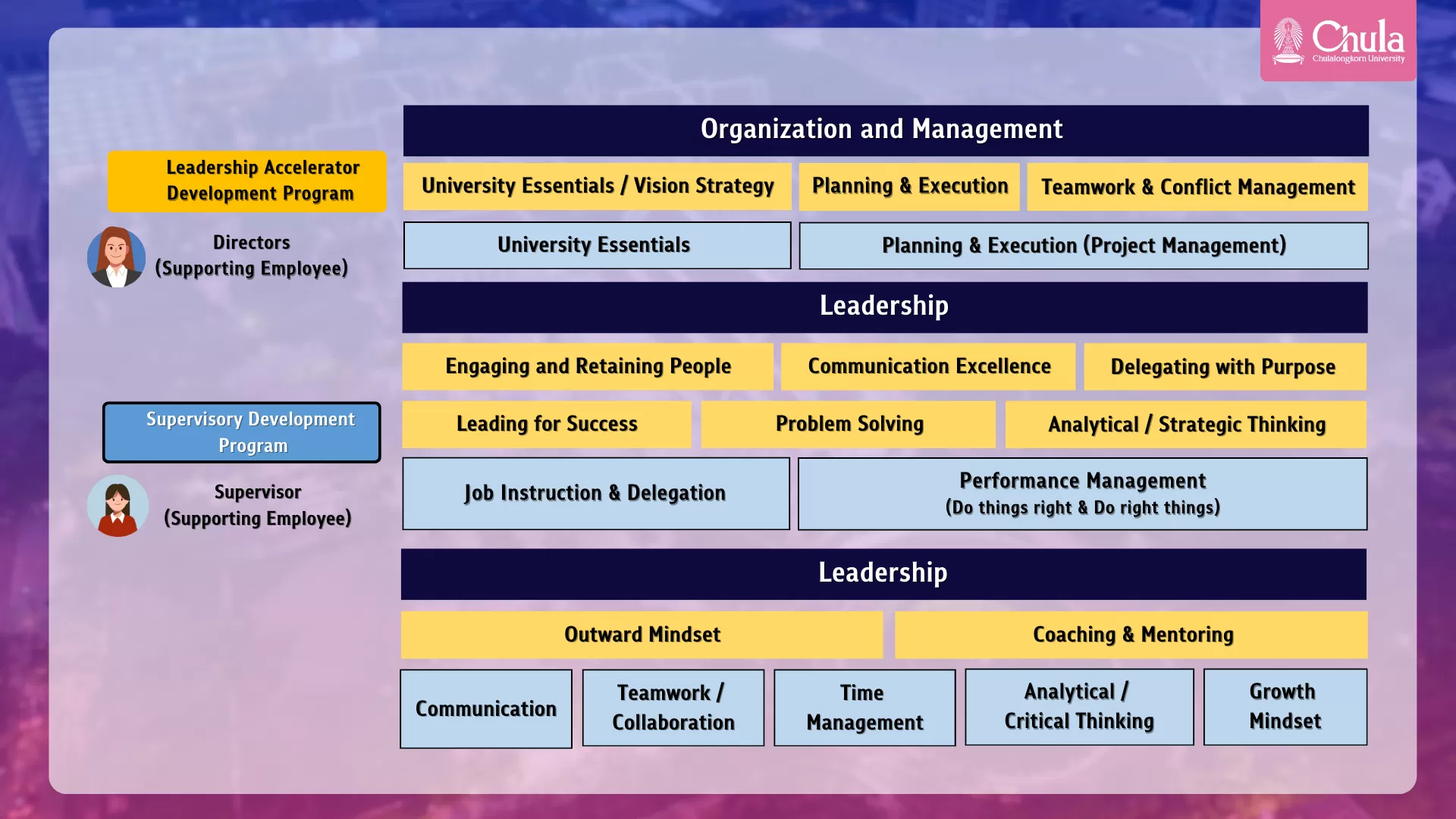
The personnel development plan for the Operational Leadership Group is designed as the Leadership Accelerator Development Program, which includes Directors of Offices, Directors of Divisions, Directors of Centers, and Heads of Departments. The development for this group has been carefully designed with essential core courses, divided into three main components:
Part 1 Organization and Management includes the courses University Essentials / Vision Strategy, Planning & Execution, and Teamwork & Conflict Management. These courses aim to help leaders understand the context of the university in alignment with its goals, leading to effective planning and actionable execution for tangible results.
Part 2 Leadership focuses on developing the components of effective leadership and various thinking principles. Topics include Engaging and Retaining People, Communication Excellence, Problem Solving, Delegating with Purpose, Analytical Thinking, and more.
Finally, Soft Skills include Supervisory Skills, which provide leaders with approaches to manage tasks and people effectively to achieve success in their responsibilities. This includes Time Management, Coaching & Mentoring.
In addition to the development framework, the Operational Leadership Group should engage in knowledge exchange and experience-sharing with both internal and external executives to build networks and learning partnerships. They should also develop skills in team building and have opportunities to work alongside senior executives, taking on responsibilities in key projects. This will help prepare them and identify outstanding individuals who are ready to progress to higher executive levels.

The Academic Personnel Development Plan is divided into two main groups: 1) Faculty members and 2) Researchers. This plan focuses on the development of faculty and researchers from the moment they start their positions, through the development of expertise in their professional fields, as well as preparing them with management skills and various soft skills. The goal is to ensure that both faculty members and researchers have strong academic competencies, along with the necessary social skills to perform their work effectively. In addition, the development of academic personnel also includes the development of international faculty members who join Chulalongkorn University.
The development of academic personnel is divided into 3 main programs as follows
1.Onboarding
1.1 Onboarding activities, which are held from the first day of employment, aim to help academic personnel understand the organizational culture, living conditions, and the essential work practices.
1.2 The New Faculty and Researcher Orientation Program is designed to help new faculty and researchers understand the organization deeply and gain an understanding of academic work. The program covers topics related to the university’s operational direction, the role of new faculty and researchers in ensuring the sustainability of Chulalongkorn University, excellence in teaching and student development, excellence in research and social services, and professionalism.
2.Professional
2.1 New Learning Program is designed to help academic personnel understand the context of being a teacher who not only teaches but also promotes learning. It also equips them with new techniques or tools for teaching. The program includes courses such as Excellence in Teaching, Learning Design and Delivery, Innovation in Learning, and it is supplemented with additional relevant courses such as Active Learning and Objective-Based Learning.
2.2 Research and Innovation Program is designed to support academic personnel in conducting research. It includes core courses that every researcher should be familiar with, such as soft skills, strong foundation, economic impact, and social impact, among others. Additionally, there are supplementary courses within this program.
2.3 The Student Advisor Program is designed to develop faculty members’ skills, knowledge, and abilities in advising and counseling students. The program includes courses such as Fundamental Psychology for Advisors, which provides basic psychological knowledge and understanding, followed by opportunities for further learning and practical exchange through topics like Wellness Journey for Advisors. Additionally, faculty members will be supported by COP Advisor groups or Counseling groups to discuss case studies and exchange experiences, gaining strategies for effectively supporting students.
3.Leadership / Soft Skills
In terms of Leadership / Soft Skills development, it is an ongoing process that focuses on three main areas as follows
3.1 Thinking Skills aim to develop cognitive abilities in various aspects, such as Critical Thinking, Analytical Thinking, Creative Thinking, and Design Thinking processes.
3.2 People Skills aim to develop interpersonal skills, such as communication, empathy, and supporting diversity and inclusion.
3.3 Enriching Life
This development focuses on addressing important and necessary topics that are relevant to both the present and future. It aims to support personnel in learning, possibly through self-directed learning via various channels, using new tools to stimulate learning. This will help foster a culture of sustainable learning within the organization. Topics may include personal financial planning, stress management, and applying mindfulness principles for a meaningful life.
In addition to developing the core curriculum topics, the university has considered other methods that can promote, motivate, and foster a sense of engagement with employees, such as
Sustainability mindset
Communication
Learning Reinforcement & Recognition
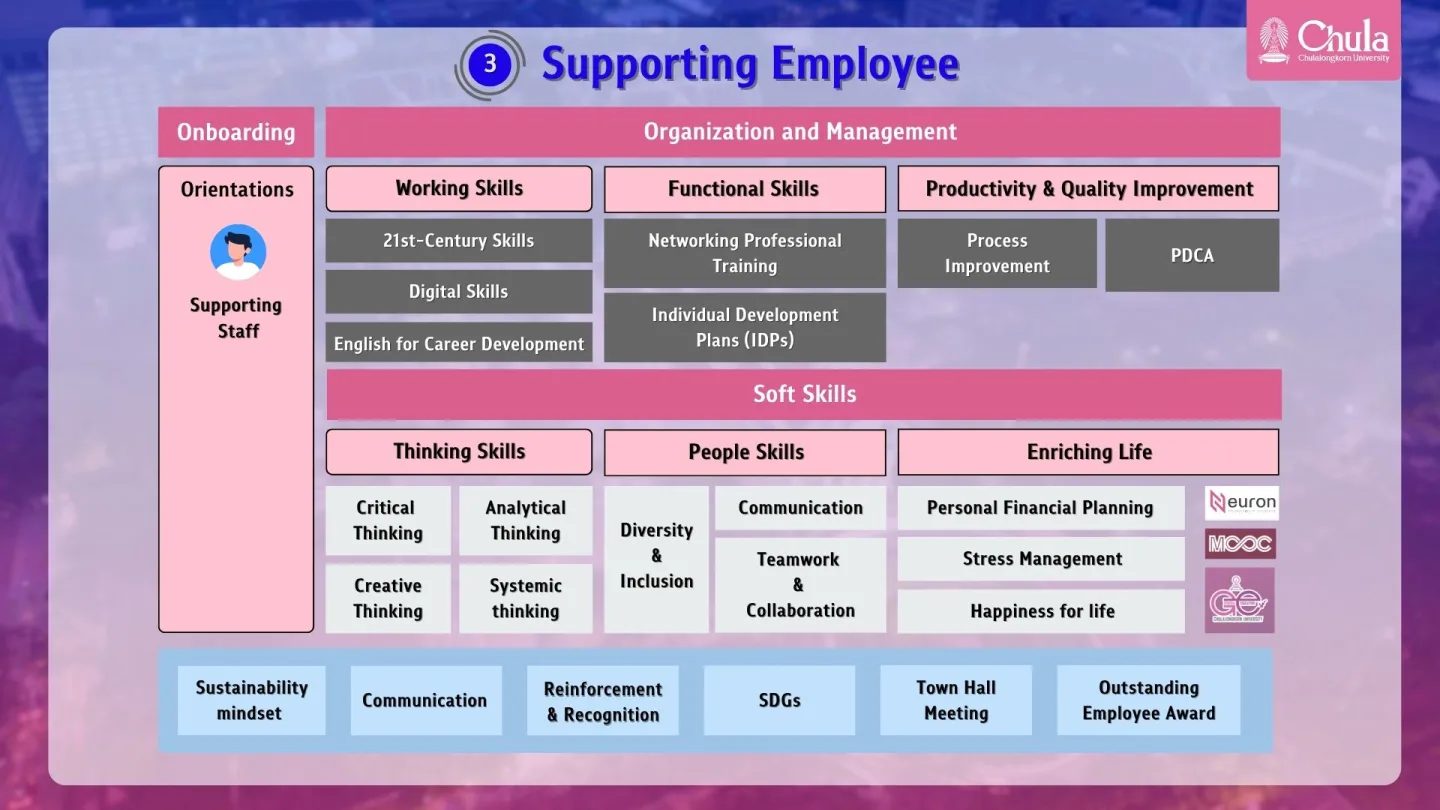
The development plan for operational staff follows a structured approach starting from the moment they join the organization, progressing through the development of expertise in their specific operational roles, and advancing to the acquisition of management skills and soft skills, similar to the development path for academic staff.
The development for operational staff is divided into three main programs as follows
1.Onboarding
1.1 First Encounter “Reak Pop” Activities: These activities are organized from the first day of employment to help operational staff learn and understand the organization’s culture, environment, and essential work foundations. The goal is to familiarize new employees with the organization’s values, practices, and expectations, ensuring they feel integrated into the workplace and are well-prepared to perform their roles effectively.
1.2 Chula Newcomers Orientation Program: This program is organized to help new employees understand the organization in-depth. The key content includes instilling the “Heart of Chulalongkorn,” skills for working in the 21st century, and essential knowledge and practices that employees should know and follow at the university.
2.Professional
2.1 Working Essential Courses: These courses aim to promote the development of knowledge, understanding, and skills essential for effective work performance. The courses include Digital Skills and English for Career Development. In addition, operational staff should also receive supplementary courses to enhance their work efficiency, such as courses on data analysis, which can be applied to relevant tasks.
2.2 Functional Skills Courses These courses focus on enhancing staff competence in their core areas of responsibility, ensuring that they can develop the necessary skills to perform their tasks effectively. They are also aimed at supporting career growth and advancement along a defined career path. To support this, the university has established 18 professional networks for operational staff, which facilitate periodic knowledge exchange within each network. These professional networks play a key role in determining relevant course content to address specific development needs and may also recommend external training opportunities (Public Training) that will benefit employees, their departments, and the university as a whole.
In addition to the development programs mentioned, the university currently promotes staff development by encouraging employees and their supervisors to collaboratively plan and design an Individual Development Plan (IDP). This approach helps staff to develop competencies aligned with their job responsibilities and enables them to improve their skills to perform their duties effectively.
2.3 Productivity and Quality Improvement Courses: are development programs designed to help operational staff understand and learn the processes involved in quality improvement in their work. These courses aim to instill principles of continuous improvement and emphasize the importance of refining the tasks they are responsible for. Examples of courses in this area include PDCA Thinking and Process Improvement, which provide staff with the tools and methods to enhance their work processes effectively.
3.Leadership / Soft Skills
In the development of Leadership/Soft Skills, the focus is on creating future leaders, in line with one of the university’s strategies, similar to academic development. This is a development program that should be provided to all members of the organization, ensuring widespread and continuous growth. The development process focuses on Thinking Skills, People Skills, and Enriching Life, aiming to equip staff with the essential skills required both in the present and future. The approach will incorporate emerging topics and skills, encouraging individuals to learn in a self-directed manner through various available channels. The use of new tools and techniques will stimulate learning, fostering a sustainable culture of learning within the organization. This development process is designed to support and enhance staff skills, ensuring they are well-prepared for the challenges of tomorrow.
In addition to the main development programs, the university also organizes an annual Town Hall meeting to facilitate interaction between senior management and staff, providing a platform for policy communication. This also includes opportunities for staff to engage in projects such as projects that are related to SGDs. Additionally, activities are organized to help employees understand the direction of the university’s operations, such as Town Hall meetings and other communication efforts. Moreover, to foster a sense of belonging and value, the university recognizes employees through various awards, such as the Outstanding Civil Servant Award, awards from the Council of Civil Servants, University Staff, and Employees of Thailand (PCTU), and the Chulalongkorn’s Good People Award. These activities are an important aspect of personnel development, contributing to the well-being of employees by recognizing their value and fostering a culture of appreciation. This boosts morale and encourages employees to embrace new challenges and continue learning.
Temporary office:
Mezzanine Floor M2, Chaloem Rajakumari 60 Building (Chamchuri 10 Building)
and Meeting Room 204, 2nd Floor, Chamchuri 3 Building
254 Phayathai Road, Wang Mai Subdistrict, Pathum Wan District,
Bangkok 10330, Thailand
Tel: 02-218-0151
e-Mail: hr@chula.ac.th
